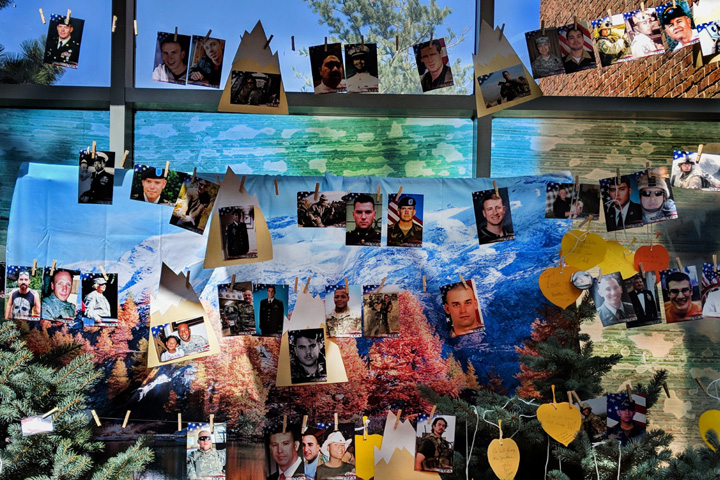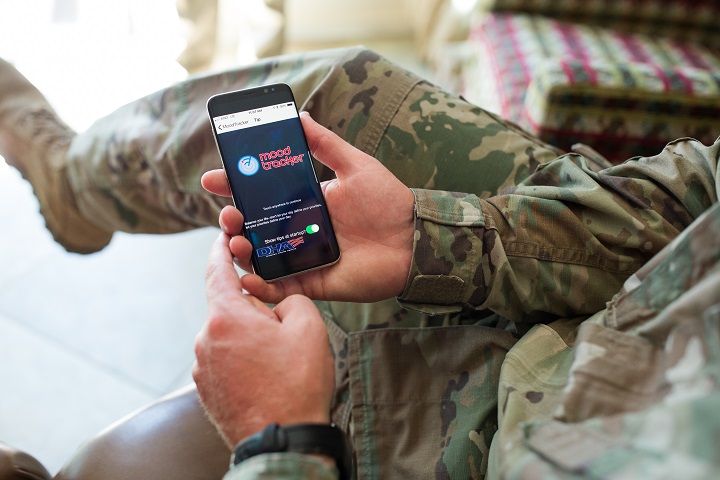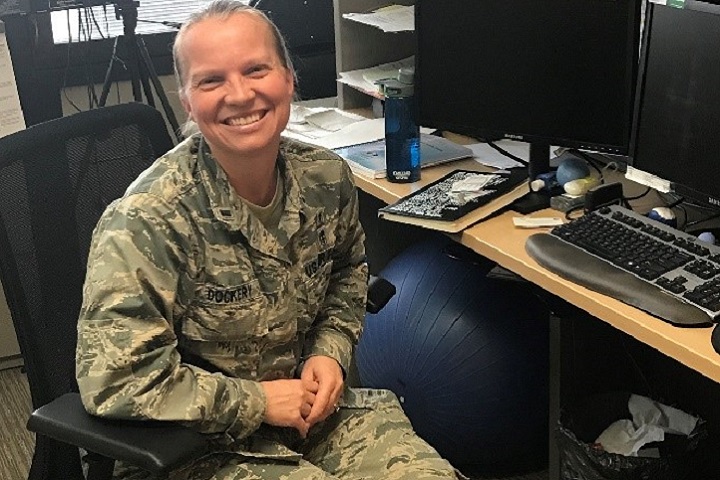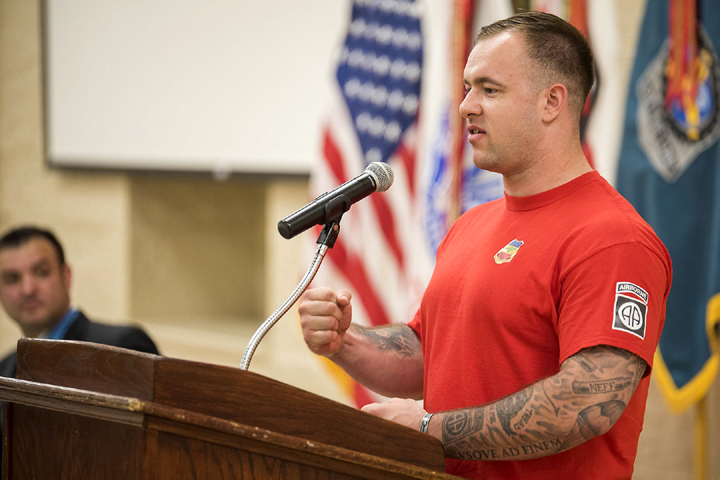
Study's focus: Mending hearts broken by deaths of military loved ones

Young military family members at a Tragedy Assistance Program for Survivors Good Grief Camp in Denver, Colorado, created this collage to memorialize their lost loved ones. (U.S. Air Force photo by Senior Airman Arielle Vasquez)
Family members of those serving in the nation's armed forces endure many hardships, including long separations, frequent moves, and limited job opportunities. Some are faced with the most difficult burden of all: the death of their loved one. A groundbreaking study is exploring whether two virtual tools can help military family members move forward after suffering devastating loss.
"Grief is normal, and experiencing considerable emotional pain related to the death of a loved one is also normal," said Dr. Stephen Cozza, a retired Army colonel, psychiatrist, and professor at the Center for the Study of Traumatic Stress at the Uniformed Services University of the Health Sciences in Bethesda, Maryland.
"We should never expect grief to disappear," Cozza said. "But over time, we do expect grief to find its rightful place in someone’s life so that there also can be opportunities for people to live in productive and joyful ways."
Some people, however, may have ongoing difficulty adapting to grief. "People can continue to be so preoccupied with the death that they're unable to find happiness or engage in the world or in social interactions," Cozza said.
This prolonged, life-dominating grief is called complicated grief, and it may cause mental as well as physical health ailments. According to the American Heart Association and numerous studies, chronic stress caused by factors including grief may lead to heart disease and other illnesses.
USU is collaborating with Columbia University in New York on the study, Stepping Forward in Grief, which is funded by the Department of Defense. Cozza's co-lead investigator is Dr. Katherine Shear, a psychiatry professor at Columbia, and founder and director of the Center for Complicated Grief.
USU embarked on this latest study as an outcome of the National Military Family Bereavement Study, which spanned seven years, from 2010 to 2017, and involved 2,000 adult and more than 100 child survivors of military deaths.
"We saw that study as an important opportunity to both understand and describe the experiences of surviving family members," Cozza said. And while the findings showed most were doing well, "there was a small but significant group of individuals who continued to struggle with their grief, sometimes even many years after the death," Cozza said. "Those are the people we're most concerned about."
In an effort to provide better support to all surviving family members, USU and Columbia developed two research-based tools accessible on personal computers and mobile devices. GriefSteps is focused on successful adaptation to loss, while WellnessSteps promotes general health and well-being activities. The Stepping Forward in Grief study is testing the effectiveness of the two programs.
Family members interested in taking part in the study complete a survey and a telephone interview. Then they're randomly selected to download one of the two programs for six months of use. They're also assigned a guide who will answer any questions and provide information through telephone calls as well as a messaging system built into each program.
Cozza said he isn't aware of any studies comparing complicated grief in military family members and their civilian counterparts. However, complicated grief in military family members wouldn't be surprising, he said.
"We know that military deaths are often of young people," Cozza said. "They're untimely deaths. And they're often sudden and violent deaths." Of the 16,000 service members who died while on active duty in the decade after 9/11, he said, 85 percent were sudden and violent losses including by combat, accident, and suicide.
Approximately 250 family members are already in the Stepping Forward in Grief study, Cozza said. The goal is to recruit an additional 280 by the end of June, when the enrollment period ends.
The study initially was limited to immediate family members – parents, spouses, adult children, and adult siblings – of service members who died after 9/11. Cozza said the inclusion criteria recently has broadened to all family members and also close friends of fallen service members. Further, the service members' deaths could have occurred at any time.
"Grief is an experience everybody has at some point in their lives," Cozza said. "It's a very challenging time when it's hard to think about anything other than the person who died. With this study, we hope to find ways to help survivors so that grief can find its rightful place in their lives, allowing room for joy, friendships, and fulfillment."
It's complicated: Our relationship with social media
Article
2/13/2019

Social media can help connect and reconnect people; however, it may increase feelings of isolation or remind people of what they don’t have
Technology Solutions for Psychological Health
Congressional Testimony
2/1/2019
HR 3219, HAC Report FY 2018, 115-219, Pg. 287-288
Traumatic Brain Injury/Psychological Health
Congressional Testimony
1/25/2019
S. 3000, SAC Report for FY 2017, 114-263, Pg. 193
Mental Health Assessments for Members of the Armed Forces
Congressional Testimony
1/11/2019
HR 3979, NDAA Report for FY 2015, Sec. 701
Recognizing the holiday blues
Article
12/19/2018

There are some individuals who are normally happy and content who can also experience holiday blues
A pain in the brain may be a migraine
Article
11/15/2018

Women affected three times more frequently than men
DHA IPM 18-019: Guidance for Service Implementation of Separation Mental Health Assessments
Policy
This Defense Health Agency-Interim Procedures Memorandum (DHA-IPM), based on the authority of References (a) through (c), and in accordance with the guidance of References (d) through (g): • Assigns responsibilities and provides instructions for implementing Reference (d), which requires an MHA for Service members prior to separation in accordance with References (e) through (g). • Is effective immediately; it will be incorporated into DHA-Procedural Instruction xxxx.xx, “Separation History and Physical Examination.” This DHA-IPM will expire effective 12 months from the date of issue.
- Identification #: 18-019
- Date: 11/8/2018
- Type: DHA Interim Procedures Memorandum
- Topics: Mental Health Care | Assessments
Women and depression
Article
10/30/2018

1 in every 8 women develops clinical depression during her lifetime
Pilot Program on Investigational Treatment of Members of the Armed Forces for TBI and PTSD
Congressional Testimony
10/9/2018
HR 3304, NDAA for FY 2014, Sec. 704
What to Expect at Your First Appointment
Video
9/20/2018

You’ve reached out for help, you’ve found the right provider, now Kristin Gwin from Walter Reed National Military Medical Center shares what to expect at your first appointment.
Kristin Gwin, Walter Reed Social Worker Talks About Getting Help
Video
9/12/2018

Kristin Gwin, a Social Worker at Walter Reed National Military Medical Center understands that getting help can be an intimidating process. She offers advice on how to get started by letting a professional know you want help.
Stopping bullying takes understanding, involvement
Article
9/7/2018

Bullying can leave visible and invisible wounds and have lasting effects on children and teenagers. Signs of the behavior can vary, and bullying others and being bullied are not mutually exclusive, experts say.
How sharing my PTSD struggles helped others—and me
Article
9/4/2018

Army Sgt. Jon Harman 82nd Airborne Division, liaison officer at Walter Reed Military Medical Center
Getting off tobacco road leads to renewed relief
Article
8/10/2018

One service member’s struggle to become smoke-free
DHA PI 6490.01: BH Treatment and Outcomes Monitoring
Policy
This Defense Health Agency-Procedural Instruction (DHA-PI), based on the authority of References (a) and (b), and in accordance with the guidance of References (c) through (k): a. Establishes the Defense Health Agency’s (DHA) procedures for the collection and analysis of BH outcome data. b. Addresses how DoD will standardize BH outcome data collection to: assess variations in mental health and substance use care among in-garrison medical treatment facilities (MTFs) and clinics; assess the relationship of treatment protocols and practices to BH outcomes; and identify barriers to provider implementation of evidence-based clinical guidance approved by DoD. c. Designates the Army as the DoD lead Service for maintenance and sustainment of the Behavioral Health Data Portal (BHDP) in specialty care mental health and substance use clinics, referred to collectively as BH clinics, until BHDP functionality can be integrated with GENESIS or another electronic health record (EHR) system managed by DHA. d. Designates DHA Information Operations (J-6) as lead on transitioning BHDP functional requirements related to outcomes monitoring to future EHR data collection platforms and processes.
- Identification #: DHA PI 6490.01
- Date: 7/12/2018
- Type: DHA Procedural Instruction
- Topics: Mental Health Care | Substance Abuse





















.png)












No hay comentarios:
Publicar un comentario